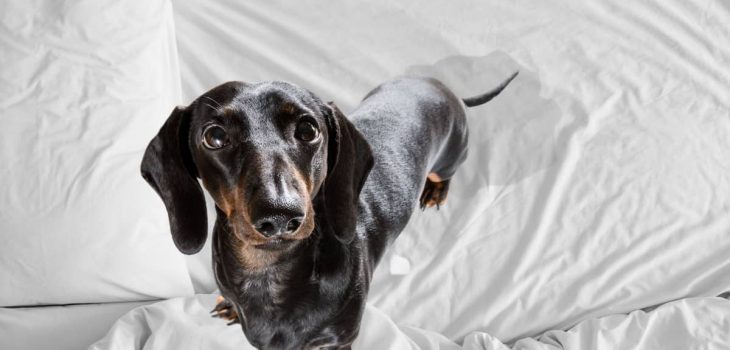Dogs are easier to deal with than cats in many ways but potty training isn’t one of them. So, my dog peed on my bed for the first time – what should I do?
This is one of those questions that seems so distant and innocent to experienced dog owners but also feel absolutely impossible and infuriating to new dog owners. Whether we own a Saint Bernard or a Dachshund, seeing that the dog peed on my bed is just never fun.
So, what can you do about it? What does this behavior even mean? Let’s go over all that below.
My Dog Peed On My Bed For The First Time – What Might That Mean?
Why did my dog pee on my bed? There really are three possible answers to that. Each has its own reasons and solutions, and, fortunately, most cases are fairly easy to deal with if you act soon and adequately enough.
Marking Territory
Peeing as a form of territorial marking is as frustrating as it is easy to deal with. Many dog owners never have to deal with this problem because avoiding it is fairly easy even if you’re not trying.
You shouldn’t be too bad on yourself if that’s happening to you, however. Instead, let’s just go why a dog would do this?
The three most common reasons for a dog to pee territorially are:
- It’s a newly adopted dog that’s trying to assert dominance. All you need to do in that case is standard obedience training – something that’s a must for all dogs anyway. Just focus on positive reinforcement and persistence and the training is bound to go well.
- An unneutered young male pup that’s just now reaching adolescence. If you’re late with neutering our male dog, it may start trying to mark its territory. Take this as a sign that you should go neuter your dog immediately unless you want the problem to continue.
- A poorly trained and disobedient dog, usually of a particularly strong-willed and stubborn breed. This can happen to rookie owners who’ve picked a breed that requires extra obedience training. If that’s your case, don’t feel too bad – just read up some more on obedience training and get your dog back on track.
As for how you can figure out that your dog’s peeing even is due to it marking its territory – that’s usually easy to tell by the volume of the pee. If your dog has made a puddle, that’s likely not territory marking. Instead, when marking territory, dogs tend to spray small quantities of pee in various different locations.

Learn more about: A Quick Guide On How To Stop An Older Dog From Peeing In The House
Psychological Issues
The answer to “Why does my dog pee on my bed?” is very often simple psychology. Dogs are emotional beings, just like us, and we can often misread their emotional states even when we think we are in tune with our canine pets. Some of the types of emotional distress that can cause your dog to pee on your bed, couch, or other places include:
- Fear and stress. Dogs can easily get stressed out by almost any major change at home. These include moving to a new place, adding new house members, losing a family member, separation anxiety, recent quarrels with you, major home renovation, or even something as simple as a noisy party or fireworks outside.
- Prolonged loneliness. Separation anxiety alone can get your dog to pee itself in a day, even if that’s not that common. However, if you let this problem continue for days, weeks, and months, your dog will get more and more likely to get very depressed. In that condition, peeing out of anxiety becomes not just a possibility but a very high probability.
- Simple impatience. Many dogs just get impatient when it’s their time to go pee. Potty training is the main way to get your dog to hold on until it’s time for a walk but some dogs just can’t hold on as much as others. Sometimes, this is a physical issue, as we’ll talk about below, but other times it’s just an incurable impatience. If you’ve trained your dog well and it still can’t wait, it’s likely time for you to switch up the walking schedule.
Medical Problems
So, my dog peed on my bed for the first time – how do you know if the reason is medical? Generally, speaking, if the puddle is large, the problem is either psychological or medical. Ruling out psychological issues is fairly easy based on your dog’s behavior and circumstances. And, if the issue is neither a matter of territorial marking or psychology, you’ll need to get your dog to the vet to look for a possible health problem.
Some of the main health causes for uncontrollable peeing include:
- Kidney disease
- Kidney/bladder stones
- Urethral sphincter incompetence
- Cushing’s disease
- Hyperthyroidism
- Diabetes
- Ectopic ulcers
- Pyometra
Mobility issues such as Hip and Elbow Dysplasia can also be the cause of the problem by simply preventing your dog from moving when it needs to pee. Certain cancers and other tumor-related diseases may also be an issue. Either way, you should always get your dog to the vet if you suspect a medical issue and just follow your vet’s instructions and recommendations.
My Dog Peed On My Bed For The First Time – What Can I Do?
Depending on the cause of the issue, there are quite a few different things you can try. As you can see from the sections above, almost any problem is treatable. Even the harshest health conditions can be dealt with if you catch them early. So, depending on what you’re dealing with, the main tips include:
- Give your dog plenty of walks. More often than not, your dog simply isn’t getting enough outdoor time. Two long walks a day will usually be enough for most dogs but sometimes a third walk is just necessary. And, still, many dog owners try to get by with just one daily walk.
- Train your dog properly. Potty and obedience training are an absolute must for any dog, regardless of its breed.
- Be on track with your dog’s preventative medicine and health prevention. This includes vaccinations, deworming, and so on.
- Keep your dog in good spirits and in an emotionally healthy environment. Mental health is health too, so make sure that’s in order.
If you take good care of your dog, indoor peeing shouldn’t be something you encounter. Accidents sometimes happen, however, so you should always be ready to help your dog when there’s a problem. And, besides – keep in mind that it might just be a one-time problem and it isn’t always a symptom of something major.




